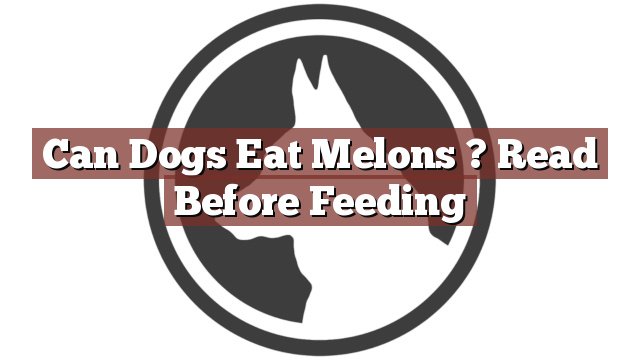Understanding Your Dog’s Dietary Needs
As a responsible pet owner, it’s essential to understand your dog’s dietary needs to ensure their health and well-being. While dogs primarily thrive on a diet of high-quality dog food, many owners wonder about adding fruits and vegetables to their furry friend’s diet. It’s important to remember that not all human foods are safe for dogs, as their digestive systems differ from ours. Before introducing any new food into your dog’s diet, it’s crucial to research and consult with a veterinarian to ensure it is safe for consumption.
Can Dogs Eat Melons? Read Before Feeding
Now, let’s tackle the question: can dogs eat melons? The good news is, yes, dogs can eat melons in moderation. Melons, such as watermelon, cantaloupe, and honeydew, can be a refreshing and healthy addition to your dog’s diet. These fruits are packed with vitamins, minerals, and antioxidants, which can benefit your furry companion. However, it’s important to remember that melons should only be given to dogs in small quantities and without any added sugars or seasonings.
Pros and Cons of Feeding Melons to Your Dog
Feeding melons to your dog can have several benefits. Firstly, melons are hydrating due to their high water content, which can be especially beneficial during hot summer months. Additionally, they are low in calories and fat, making them a healthy alternative to processed treats. Furthermore, melons are a good source of essential vitamins like A and C, as well as potassium, which can support your dog’s immune system and overall health.
However, there are a few considerations to keep in mind when feeding melons to your dog. Some dogs may have difficulty digesting melons, leading to an upset stomach or diarrhea. Therefore, it’s crucial to introduce melons gradually and monitor your dog for any adverse reactions. Additionally, be sure to remove any seeds or rind from the melon, as they can pose a choking hazard or cause intestinal blockage.
In Conclusion: Considerations for Feeding Melons to Your Dog
In conclusion, melons can be a tasty and nutritious addition to your dog’s diet when given in moderation. Before feeding melons or any other human food to your dog, it’s important to consult with your veterinarian to ensure it is safe and suitable for your pet. Remember to introduce new foods gradually, monitor your dog for any adverse reactions, and always remove any seeds or rind before feeding. By considering your dog’s dietary needs and making informed choices, you can provide them with a well-balanced and enjoyable diet.
Thank you for taking the time to read through our exploration of [page_title]. As every dog lover knows, our furry friends have unique dietary needs and responses, often varying from one canine to another. This is why it's paramount to approach any changes in their diet with caution and knowledge.
Before introducing any new treats or making alterations to your dog's diet based on our insights, it's crucial to consult with a veterinarian about [page_title]. Their expertise ensures that the choices you make are well-suited to your particular pet's health and well-being.
Even seemingly harmless foods can sometimes lead to allergic reactions or digestive issues, which is why monitoring your dog after introducing any new food item is essential.
The content provided here on [page_title] is crafted with care, thorough research, and a genuine love for dogs. Nevertheless, it serves as a general guideline and should not be considered a substitute for professional veterinary advice.
Always prioritize the expert insights of your veterinarian, and remember that the health and happiness of your furry companion come first.
May your journey with your pet continue to be filled with joy, love, and safe culinary adventures. Happy reading, and even happier snacking for your canine friend!

